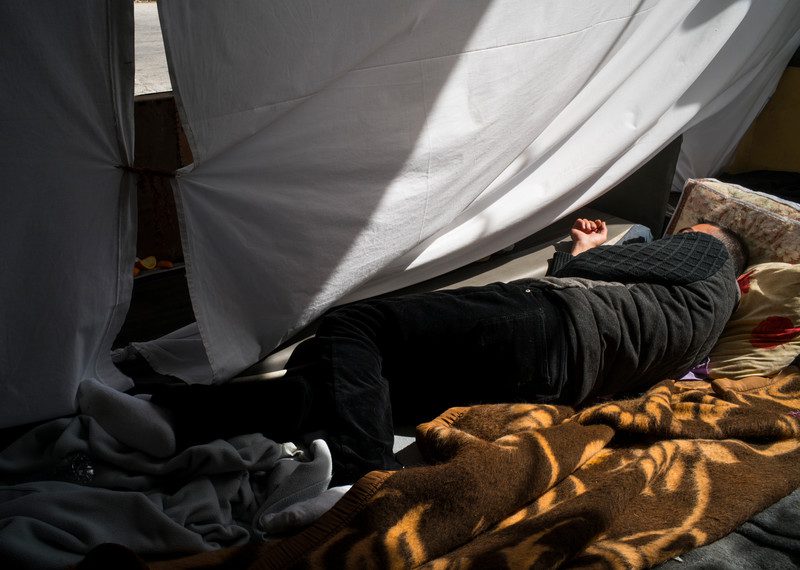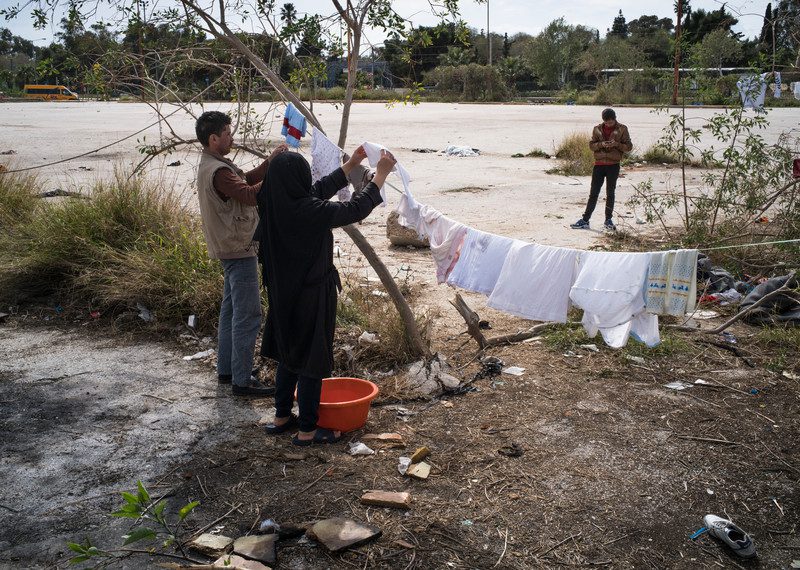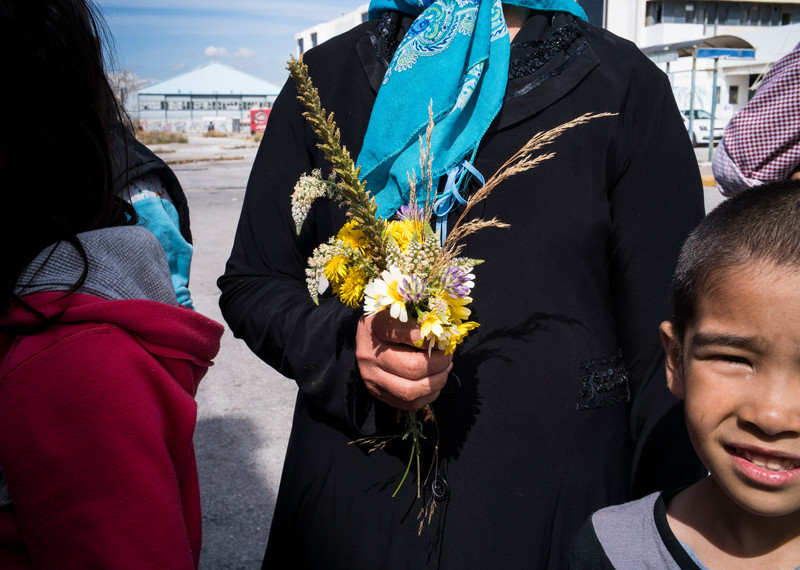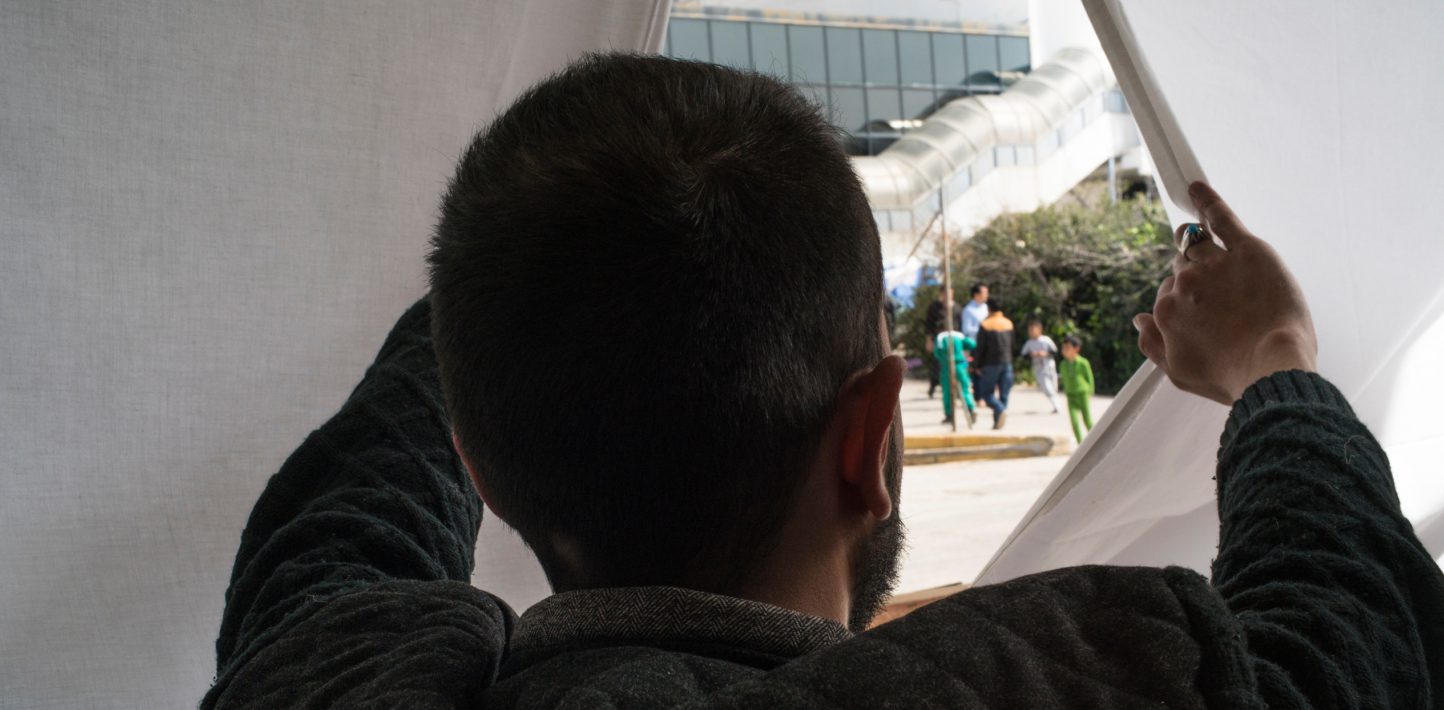Masih from Afghanistan narrowly missed his chance to cross the Macedonian border at Idomeni, only to be trapped in Greece with thousands of others.
Masih* (*not his real name) is a thin young man aged 30, smartly dressed in black trousers and jacket. You wouldn’t know he’s been sleeping rough for weeks, but his exhaustion and deep frustration are visible.
After a long, lonely journey from Afghanistan through Iran and Turkey, he reached the Greek island of Lesvos by rubber boat and caught the ferry to Athens. He reached the village of Idomeni near the former Yugoslav Republic of Macedonia just as its border was closing, first to refugees from Afghanistan and soon other nationalities too.
“I got there on 18 February,” he says. “They put us in group – I was group 25. There were two Afghan guys in group 24 and they got through. We were supposed to leave Greece, but then the Macedonian police checked my paper and I was the first Afghan to be turned back.
“They didn’t say why – just ‘Afghans, we have a problem’. The next day we had a demonstration and went to talk to the head of the Macedonian police. They said it was Austria not accepting Afghans, and Serbia sending people back. We were hoping the border would open again after a few hours.”

Back in Athens, it’s a total mess
But after eight days in the rain and mud, stuck in a tent with 200 people alongside thousands of others, Masih and his nine travelling companions gave up. He says that after the police forced some Afghans to return to Athens, they paid a bus driver €15 each to go back freely.
“But [the bus] didn’t move,” he explains. “And when the police brought buses for free, the driver didn’t give us our money back. I told the police and they did nothing. They brought us directly here.”
I have no idea why Europe has closed the border.
Masih from Afghanistan
Masih is referring to Elliniko, Athens’ former international airport, squeezed between a busy motorway and a beach on the outskirts of the city. After the border closed, it became a makeshift camp for mainly Afghan refugees
Rusty old signs still signal “international” and “domestic” departures. But for now, nobody here is going anywhere.
“It’s a total mess – there is nothing here,” Masih says. “Everybody is sleeping on the floor in the old terminal hall. We don’t even have basic things. There is a toilet but it is so dirty. I think there are 1,000 people here now. I was given a number above 1,500 when I arrived.
A Greek official later tells us there are over 4,000 people here, split across the old airport, and two former Olympic basketball and hockey stadiums. She says they are trying their best, with volunteers distributing food and other essentials, but it isn’t enough.
“There’s no space for families – everyone is mixed up. I don’t sleep in there – it’s smelly,” Masih says. Instead he has created a makeshift shelter outside, where he sleeps with a friend. His sleeping bag was stolen a few days ago. “I have some blankets,” he says.

Threatened by the Taliban
Masih explains in his excellent English that he left Afghanistan after being threatened by the Taliban, because he had worked for several international organisations. He shows us references from both the UN and NATO.
Originally from Ghazni, a city in eastern Afghanistan, he lived in Kabul from 2002, and left his job after the first threat came. When he was threatened again, he paid a smuggler USD$2,500 to get to Greece.
“When I left the borders were open and I thought I could easily travel. I wanted to go to Germany because I can apply for asylum there.”
After three weeks, he boarded a rubber dinghy to Lesvos. “The Turkish coastguard tried to stop us by spraying water on us,” he says. “We were 33 people – children, women. Everybody was wet and cold.
“We were picked up by the Hellenic [Greek] coastguards and taken onto the big boat.” After being fingerprinted on the island, officials gave him his 30-day registration paper. “They said we could easily go to the border and cross.”
I don’t want to go back – it’s not safe.
Masih
Stuck in Greece, with very few options left
After Syrians, Afghans represent the highest number of people arriving in Greece. The UNHCR says 80% of them have fled conflict and violence.
But while Syrians and Iraqis – the third biggest nationality among arrivals in Greece – get six months to stay in Greece and figure out their options, Afghans and other nationalities only get 30 days. And unlike Syrians and Iraqis, Afghans arriving in Greece are not eligible for relocation to other European countries.
Only nationalities whose EU asylum applications are accepted at a rate of 75% or above qualify for relocation. At the moment, the percentage of applications accepted from Afghans is 57%.
Many people we meet, including Masih, feel that their treatment is deeply unfair. They point out that Afghanistan has been at war for decades, and that they need protection too.

Masih knows he is stuck. He hates it, and doesn’t understand why his options now are so few. “I have no idea why Europe has closed the border. They say most refugees have financial issues – they can check everybody’s case and if that’s true they can deport them. But for the time being there are so many people waiting here.”
Over 44,000 people were stuck in Greece as of 13 March 2016, and thousands more arrive every day. With very limited official organisation or support, the situation threatens to get much worse for the many trapped in improvised camps like Elliniko across the country.
“Now there is a rumour that they [governments] will say soon whether Afghans can travel,” says Masih, who follows the news on his phone. “I am just waiting for the decision to be announced. Everybody here is pissed off because we don’t know what’s going to happen.
“If they don’t open the border I will apply for asylum in Greece. I don’t want to go back – it’s not safe.”
This week, EU leaders are deciding on a deal with Turkey that would attack the human right to seek asylum. Join us – tell @eucopresident to #StopTheDeal NOW!


